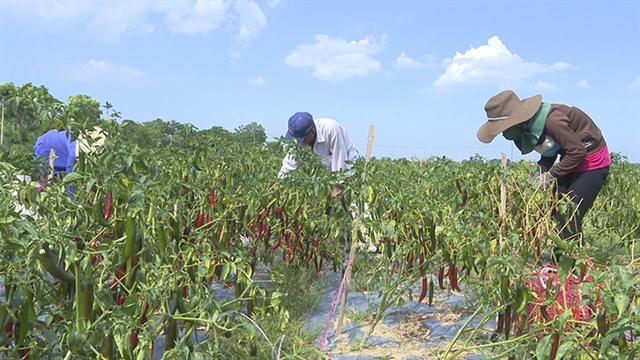 Society
Society


|
| Farmers in Quảng Trị Province harvest chili peppers. — VNS Photo Thanh Trúc |
HÀ NỘI — In his late 20s, Hồ Văn Thằng decided to launch his first business growing the species of chili pepper his family has treasured for centuries on the western mountain of Quảng Trị Province.
The idea came to the Vân Kiều ethnic man because the indigenous chili planting area had gradually disappeared, replaced by cassava.
“Since a tapioca starch factory was opened, people have switched to planting cassava as it was promised to bring them better profits,” said Thằng. “The forest with which we grew up was cut down while many precious indigenous species disappeared along with the clean environment our ancestors have lived in for years.”
Thằng was motivated by improving local people’s lives, securing their livelihoods and conserving traditional plants and cultivation methods.
According to the Government, Việt Nam is now in its third wave of start-up innovation. “Innovation” and “Industry 4.0” have become common catchphrases.
While people around the country pivot to technologies of the future, Thằng is taking a step back to embrace the traditions that nurtured him and hundreds of other people in his tribe.
“Chili pepper is just one of several traditional products we want to restore,” Thằng said. “They are all indigenous, high-quality and naturally cultivated – factors the market has been searching for.”
Nearly a thousand kilometres away, in the northwestern mountainous area in Lai Châu Province, member of the Nùng ethnic group Lý Vần Ngang formed a group of eight members to produce and gather local products, serving a similar mission – to preserve traditional values and create sustainable livelihoods for local people.
The group did surveys in both Việt Nam and China and then decided to focus first on the domestic market.
“Our mainstay is indigenous rice which can only be planted in the communes of Lai Châu,” Ngang said. “The rice has a special taste and high nutrient content.”
With quality products, good agricultural practices and high demand, it seems like the start-up businesses of Thằng and Ngang are enjoying the conditions to thrive.
But the reality is not so simple. There seems to be a missing piece of the puzzle connecting their products with consumer markets.
“Since most of our products are seasonal, it is impossible for us to maintain the supply for distributors,” said Thằng.
“How to best preserve product quality without using preservatives is another question,” said Ngang. “We want to expand the market but we cannot transport products too far.”
Poor bargaining power and price setting ability also prevent these young farmers from getting the profit they deserve.
“I often wonder how to successfully connect with traders and build sustainable ties to establish a stronger foundation for indigenous products,” Ngang said.
Organic key
Just like Thằng and Ngang, Lương Thu Hoài is a start-up entrepreneur.
She owns two shops that distribute local specialities with 80 per cent of goods coming from Hà Giang Province.
“Being a specialty, indigenous species and having clear origins are three criteria I set for any product we distribute,” said Hoài.
Understanding the concerns of Thằng and Ngang, Hoài stressed upon brand building as the first step to unlock the market.
“You have to let them know about your presence,” she said. “It is all about packaging, how you want your customers recognise your products and how they will be transported while still maintaining the best quality.”
Traceability is one of the biggest challenges for farmers like Thằng and Ngang as their focus is traditional know-how.
According to Hoài, customers want and have the right to know how the food they eat is made.
“It seems complicated talking about traceability,” Hoài said. “In fact, all you need to do is to keep track of all steps in your production – when worms appear, what kind of fertiliser you use, for example. A pen and a notebook are all you need.”
Nguyễn Công Chí, director of Digital Verifying Technology Company, has worked in the field since 2014, two years before the Government started paying attention to traceability in agriculture.
The company provides agricultural start-ups run by ethnic minority youngsters a quality management system for free for one year.
“Farmers will need to prove their products are indigenous, well made and traceable to receive the support,” Chí said.
Ngô Kiều Oanh, an independent consultant for the Ministry of Agriculture and Rural Development, said policy advocacy can be one solution to reduce the challenges faced by start-up farmers.
“Việt Nam is proud of its agricultural products, yet many of them cannot make their way to the 90-million-person market,” she said.
The Government must play the role of facilitator to create an environment in which agricultural start-ups can thrive.
In 2018, Việt Nam issued two decrees on organic agriculture and promoting co-operation in production and consumption. Both were designed to offer farmers greater opportunities and more assistance in developing sustainable agriculture.
“Farmers should focus on organic production as there is high demand and customers are willing to pay more,” Oanh said.
She gave Tiền Giang’s Province Lò Rèn star apple fruit as an example of an organic-certified specialty which was able to satisfy the US market.
“Technology will help you achieve both quality and quantity, bringing a name for your products and opening a door to export markets,” said Oanh.
“Mountainous areas have advantages to develop organic agriculture,” she said. “And farmers, accompanied by investors, traders and the Government, should be the vanguard leading the way.”
Thằng, Ngang, Hoài and other young entrepreneurs have taken the first steps towards building successful businesses based on their traditional values.
They are bound to face challenges, but with hard work and dedication to their craft, the future is bright.
“Indigenous species are our pride, the foundation and also the motivation that pushes us forward. With those lasting values, I believe I can try and thrive in my own hometown,” Ngang said. — VNS




